Sooni Taraporevala and Anand Gandhi on carving their niche in filmmaking and photography, choosing subjects that make the heart sing, and their shared love for Japanese cuisine
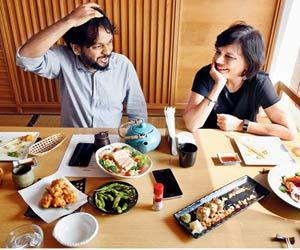
There are roadblocks that artistes hit in their career, which threaten to stem the flow of creative energy. Some get bogged down, while others dust themselves off and carry on to ensure that work that has the potential to bring about change sees the light of day.
ADVERTISEMENT
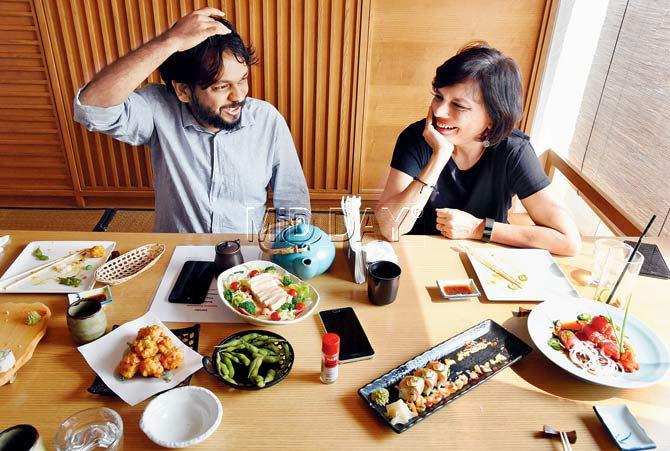
Anand Gandhi and Sooni Taraporevala at Kofuku in Bandra. Pics/Shadab Khan
On a Monday afternoon, two such creative minds meet over platters of sushi, sashimi, and edamame at Bandra's Kofuku to discuss what keeps them going. Sooni Taraporevala has had a fulfilling 2017. The filmmaker, photographer and screenwriter, who has written the screenplays for The Namesake, Mississippi Masala and the Oscar-nominated Salaam Bombay, became a member of The Academy of Motion Picture Arts and Sciences.
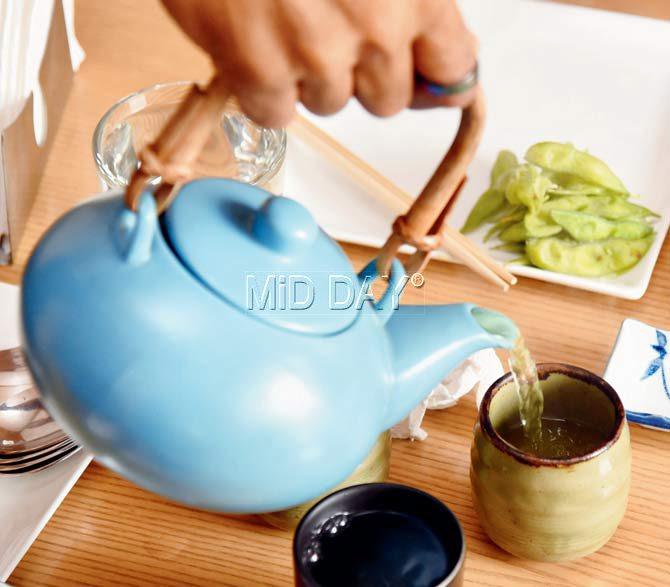
Last month, her book Home In The City: Bombay 1977 – Mumbai 2017, spanning four decades of her photographing the city, was released. Filmmaker and media producer Anand Gandhi, whose debut feature film Ship of Theseus won the National Film Award, is busy increasing the reach of the newly released and well-received film, An Insignificant Man, on the formation and rise of the Aam Aadmi Party, which he has produced. They collaborated for Yeh Ballet, a virtual reality documentary that Sooni directed for Anand's lab this year.

When they discuss their work, mutual admiration and a sense of camaraderie flows effortlessly through the conversation.
Snigdha: What is it like to create work amidst formulaic films?
Sooni: Often, the challenge is getting money to do what you want to do. It's a bit frustrating at times, but we carry on.
Anand: I am benefitting from the perseverance that the generation before me - Sooni, Mira [Nair] - has put into the work that I want to do. If what we are doing is difficult, what they did was impossible. Today, there is an audience that has not been catered to for the longest time. This is probably the Gujju in me talking, but I don't want to build a cottage industry. I am in it for changing things in a big way, out of making the content we are making.
Sooni: More power to you!

Snigdha: How has the city changed for filmmakers since Salaam Bombay?
Sooni: Earlier, you had to fill the 2,000 seats of a single screen theatre for every show. Then multiplexes came and changed the nature of the game a lot. But things still haven't changed rapidly enough because all the paradigms are still in place - who the hero is, the budget, etc. The problem is people have little faith except in what's tried and tested, Even when you are [screening] in a multiplex, if a mainstream film comes on, you are kicked out.
Anand: I try to invest myself in the reasons why things are not changing fast enough. One of them is the threshold of enlightenment that our schools are capable of providing is narrow. It has an impact on the kind of cinema or television we watch.
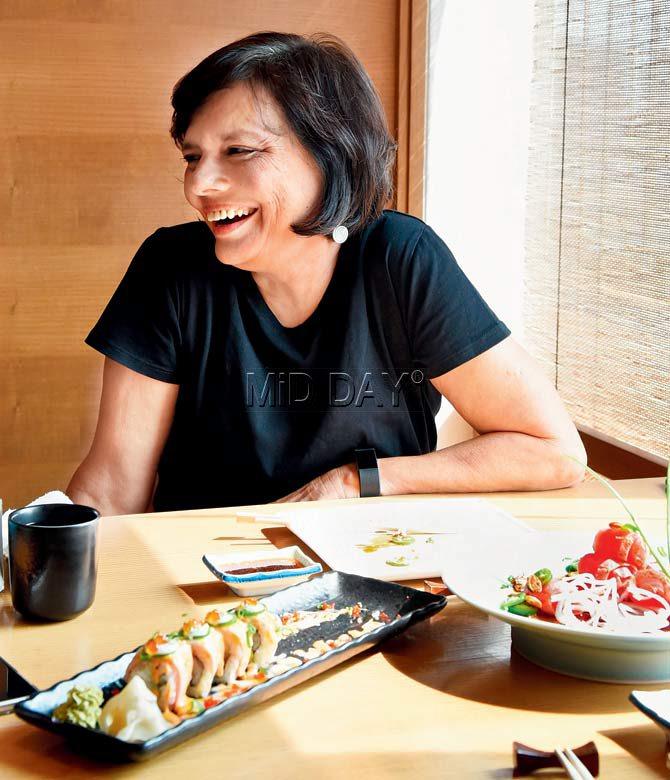
Snigdha: How do you choose a subject?
Sooni: In a nutshell, it has to make my heart beat faster. When we shot Salaam Bombay, there was a sharp divide between mainstream and what they call - and I hate this term - offbeat films. We wanted to bridge that gap and make a meaningful film using the tools of storytelling that belonged to another genre.
Anand: That applies to us as well. Our approach has been to inherit tools of mainstream fiction and apply those as façades around content coming from a deeper place. It's like packaging health food as junk food.
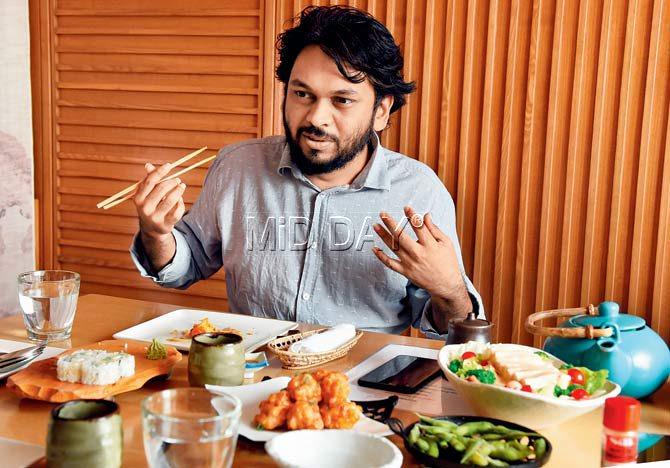
(Tuna tataki, hamachi carpaccio, veg California roll, inari nigiri and assorted sushi platters arrive.)
Snigdha: How did you come to enjoy Japanese cuisine?
Sooni: I had my first taste of Japanese food in America as a student and I have loved it since.
Anand: I have been raised by a very adventurous mother, who didn't have too many resources to her disposal. But she worked hard to ensure that the absence of resources didn't translate to absence of opportunities. I travelled a lot with her, hitchhiking and gate-crashing into places so we could sleep in the corridors. That is the most important thing that happened to me while growing up. It has prepared me for a wide variety of experiences; one of which is an appreciation of new flavours. I was introduced to Japanese food in New York and I developed a taste for it.
Sooni: Does she travel with you now?
Anand: Yes, we went to St Petersburg together for a film festival. I realised I have become adventurous in ways she isn't, but her adventure is still a part of me.
Sooni: She must be so proud of you.
Anand: I think she is a little too proud!
Quick takes
If you were to make a film on Mumbai today, what would be the theme be?
Sooni: I would make a visual portrait of the city with minimal dialogue.
Anand: Mine would be the exact opposite. I'm very didactic. My passion subject right now is women scientists of the country, so it would be something around that.
A person in the creative field who inspires you:
Sooni: Dead or alive?
Anand: Alive.
Sooni: My friend Ketaki Sheth, who is a wonderful photographer. She inspires me with her total dedication.
Anand: Khushboo [Ranka], co-director of An Insignificant Man.
She is a deep thinker of policy, pedagogy politics and social contracts of justice.
Being a filmmaker in India is...
Anand: Exciting because there is so much left to be done.
Sooni: Both a challenge and a joy.
A change you would want to see in the film industry:
Sooni: I would want the film industry to welcome a wide variety of subjects and films that don't have established stars.
Anand: One urgent demand? To stop the misogyny and wake up the idea that we are living in 2017; to be cognisant of rights and responsibilities.
 Subscribe today by clicking the link and stay updated with the latest news!" Click here!
Subscribe today by clicking the link and stay updated with the latest news!" Click here!






